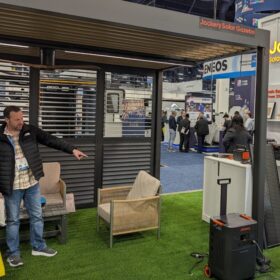Given where Enphase was just a few years ago, the company’s Q3 2019 results would be hard to predict. After struggling under heavy losses and undergoing a massive restructuring, Enphase reported a stunning 19% operating margin, and $31 million in net income in its third quarter results.
And its growth has been nothing less than stellar. Enphase was already the second-largest inverter maker in the U.S. residential market, but during the quarter it more than doubled its revenues from this time last year to $180 million. This mostly from the sale of no less than 1.8 million microinverters, or 584 MWdc of capacity.

Enphase isn’t doing so badly with cash, either, and has reached $203 million in its coffers.
This is mostly on the back of the sales of its IQ 7 microinverter, which is now being incorporated into AC modules from major brands including Panasonic, Sunpower and Solaria. Enphase has also upgraded to its IQ 7A, to accommodate modules up to 450 watts.
Geographical matters
While we don’t have exact figures on market share, it appears that Enphase is taking a bigger and bigger bite of its core market in the United States. Here the partnership with SunPower is likely a major benefit, given that in the first half of 2019 SunPower’s installer network, if taken as one company, would have the second-largest share of the U.S. residential market after Sunrun.
Enphase is expecting further revenue growth in the range of $200-$210 million during Q4, but with a slightly lower gross margin. This has not satisfied investors, with Roth Capital described the company’s guidance as “mixed/disappointing”. The company’s stock fell in after-hours yesterday after results were released.
And while Roth still sees room for growth for Enphase in the U.S. market, it has expressed concern about the company’s international business. “Many will jump to the conclusion that Enphase’s U.S. business is done growing, but we believe the real story is how much international business has fallen off,” stated Roth in a research note.
Roth says that its own analysis shows that rest of world revenues were down 15% quarter-over-quarter in the third quarter, and may fall again in Q4. Enphase CEO Badri Kothandaraman alluded to such weakness on the company’s results call, noting that Enphase is reviewing the strategic plan for Australia, a key market.
“I am confident that this region is going to bounce back as we transition into 2020,” stated Kothandaraman.
Grid independence on the way
It is also important to note that while microinverters have traditionally been the large majority of its sales, this is not all that Enphase offers. Enphase is currently launching the third iteration of its Encharge battery, a modular 3.3 kWh unit that includes the soon-to-be-launched IQ8 microinverter. Through its Ensemble system, the company can combine solar, energy storage and a generator to stay on during blackouts, but can also integrate with the grid when power is available.
The key to this is the long-awaited IQ 8, which Enphase describes as a “grid-agnostic” battery. If the company can get this product out in time, it has a ready and eager market for battery storage in California homeowners who are experiencing repeated proactive blackouts.
This content is protected by copyright and may not be reused. If you want to cooperate with us and would like to reuse some of our content, please contact: editors@pv-magazine.com.









This morning I read the following at Greentechmedia:
“Kothandaraman noted that Enphase’s new IQ 8 microinverter technology, set for commercial launch in mid-2020, will be able to power a home even without attached batteries, by providing alternating current (AC) power directly from the modules to household wiring. That’s not possible with traditional rooftop solar systems, which convert direct current (DC) power from panels to AC power at a central inverter — unless that inverter is specially equipped to disconnect itself from the grid. While the backup power of a standalone rooftop solar PV system may be marginal, for those homeowners who want it, the IQ 8 system may be a far more elegant solution, he said.”
Yeah, we reported on the IQ 8 a long time ago. Glad to see that Greentech Media is catching up.
https://pv-magazine-usa.com/2018/08/20/enphase-going-einstein-with-iq8-solar-power-inverters/
This morning I got a report from a friend in Mendocino County that he just got power back after the 5-day long PG&E shut-down. We’re in a little island in Santa Rosa that never lost power & internet, but nearby neighborhoods have been down for days. You can hear the generators running.
We have 10 solar panels with Enphase M250 Inverters, and they actually produce enough power every day this time of year to run everything, but if PG&E shuts off the power, we can’t use our solar power. That’s because the way PG&E is connected to us would allow our solar power to energize the PG&E grid. So we’re not able to be properly isolated from PG&E. That’s the first thing to fix. We might be able to do that by retrofitting Enphase IQ8 inverters on our solar panels, which might cost about $6,000. Adding a battery to the system might double the cost, but it wouldn’t help much if the power was shut off for more than a day. If we owned an electric car, and could tap into its (charged) battery in an emergency, that’s a really big power source, way more than most stationary home battery systems. We would, however, need to limit our use so we still had adequate power to evacuate to a safe location if necessary. We would not use the car battery like this on a regular basis, but I think having it available in an emergency would be a big plus. It’s not clear exactly how this would work, or if the car manufacturer’s would enable this kind of emergency capability. We shall see. Maybe we should buy a couple of electric bikes for rapid evacuation?